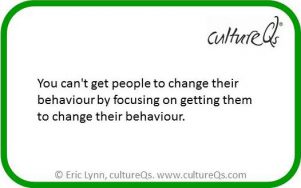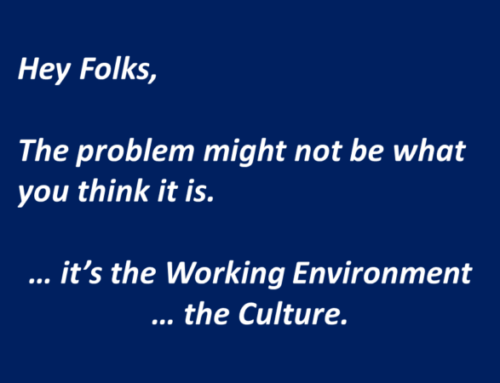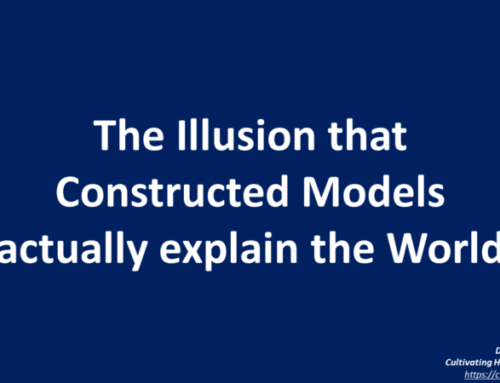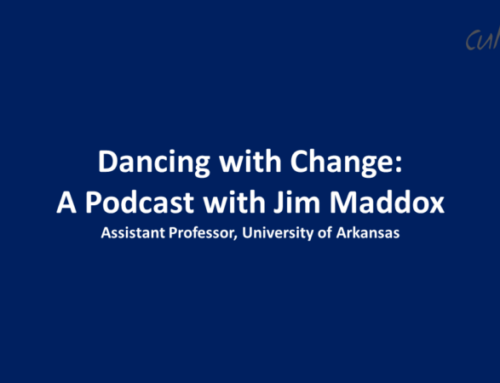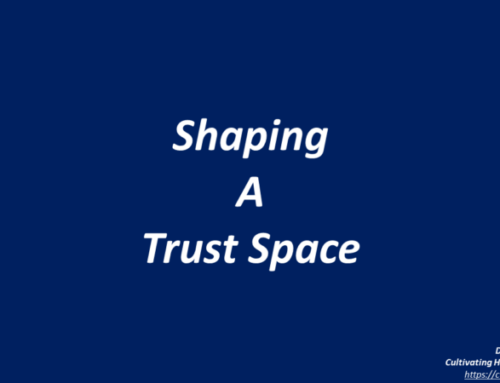Enabling Organisation Behaviour Change
It seems as though I’ve been forever hearing organisations, leaders, HR managers and consultants who don’t understand, talking about behaviour that’s … desirable, appropriate, considerate, anti-social, engaged, inappropriate … how to communicate, how to dress, how to sit, how to stand, how to behave in meetings, what to say on the phone, … and the list goes on and on and on …
And here lies the problem … they talk about what others should do.
Fortunately, this is not the way the world works … except of course in dictatorships, which themselves are certainly not fortunate.
People don’t do what you think they should do. People do what they think and feel they should do.
Yes, we know that toxic behaviour is widespread in many organisations, and it’s relatively easy to find examples of exploitation, dominance, exclusion, discrimination, mobbing, inducing stress … and more. Preaching to the people will not change the behaviour.
Similarly, many of us can recount countless examples of positive behaviour in organisations, with support, mentoring, encouragement, inspiration, collaboration … and more. None of these came about as a result of laying down rules or defining “competencies”.
Behaviour Fundamentals
- Observed behaviour is a reflection of the underlying culture.
- People’s behaviour is driven by the situation, the environment and the beliefs and values of the individual that form their attitude, their perspective of the world.
To even hope to gain an understanding of a person’s actions or reactions, we must view behaviour in relation to the environment as well as others involved in the interaction. - Behaviour never occurs in isolation … as human beings, we only actually exist in relationship.
- Inevitably, unavoidably, I can only observe behaviour through ‘my eyes’ … my personal filter of values, norms, experiences.
- Any definition of ‘desirable behaviour’ is a social construct … it is subjective and can only be so. There is no such thing as objectivity when referring to behaviour.
Humans are emotional beings. We are not mechanical units to be calibrated to ensure we ‘function’ in a pre-defined manner. Admittedly, such humans exist. The process that took them to this space is commonly known as indoctrination, which I imagine, is not a condition that any forward-thinking organisation would consider desirable.
Personal behaviour patterns form over time through life experience, with influencers that include family, society and professional background. Underlying psychological factors of which individuals may not even be aware, directly influence attitudes … the core driver of behaviour.
So … How can we encourage positive behaviour change in organisations?
We engage people around a complex challenge such as …
In 40 years of working with people, I have learned that generally, they want to contribute constructively to organisations in which they work. To do so, they need to feel invited as well as have the space to be themselves. So let’s give them the opportunity to do so …
In my work as a facilitator and change agent, I have yet to find a more effective way to encourage positive change than the combination of …
… A Genuine Invitation, and …
… Powerful Questions in a Dialogic Listening Space … through which people first connect, then focus together.
It’s a journey of genuine deep discovery that may well be challenging, but will certainly add value for the organisation and individuals … if people open themselves to the opportunity.
cultureQs enables this journey.
Perhaps you would like to discover more. Do ask …
Meanwhile, here’s a Question to reflect upon …

